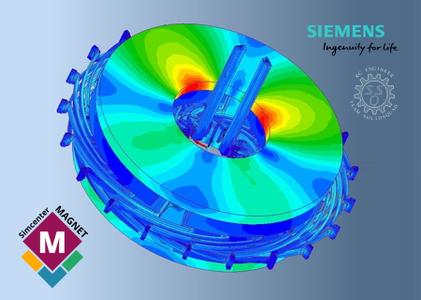
Siemens Simcenter MAGNET Suite 2020.2 | 727.8 mb
The Simcenter development team is pleased to announce the availability of Simcenter MAGNET 2020.2. This release added new features and important enhancements to share. Firstly, there's the leveraging of new high performance computing capabilities. With it, simulations have gone from days to just hours or minutes to finish solving. Secondly, calculating magnetostrictive forces (which cause that hummmmmmm you hear around power transformers) has been added. Finally, improving the modeling capabilities of permanent magnets allow them to be defined as strong or weak. Let's dive deeper into all of this new stuff:
Electromagnetic simulations on a HPC cluster
Building simulation into the design process requires that the desired information is available when needed. Waiting for data is not always an option. And when it arrives too late, it can lead to costly and avoidable redesigns or failures.
Every type of simulation has its own rhyme and reason for being computationally intensive, which increases the solution latency. To clarify, in the realm of low frequency electromagnetics simulations, some common causes include:
- Large and highly detailed models, which require fine meshes. For example, power transformers or complex electromechanical systems
- Fault conditions
- Rotor eccentricity
- Magnetic levitation or arbitrary motion
- Force calculations for NVH analysis
Simcenter MAGNET has added new high performance computing capabilities (HPC) so that simulations can run across multiple processors on a cluster, which dramatically speeds up the simulation time compared to a single computer.
In short, this means low frequency electromagnetic simulation results are available in hours instead of weeks. Consequently, this speed up in solution time means you can discover insights earlier and bring electromagnetics into your Simcenter toolset of simulation driven design.
Electromagnetic simulations are time intensive. With Simcenter MAGNET 2020.2, simulations can run on HPC clusters. In this example, a large 3D electric motor transient with motion simulation went from over 5 days to just over 5 hours to complete, achieving over a 25x speed up .
Magnetostriction with Simcenter MAGNET 2020.2
Magnetostriction is challenging to model. Often it is a parasitic phenomenon that needs to be limited or eliminated. For instance, it causes vibrations and acoustic noise that is undesirable or adversely impacts the device performance.
So, what's all the buzz about? Magnetostrictive forces, caused by a magnetic materials change in shape as a response to the magnetization process or being exposed to a fluctuating magnetic field, can cause stresses and strains in that material. Consequently, these may lead to material extension and contraction, which causes vibration and noise. Simcenter MAGNET 2020.2 includes new magnetostrictive force and field calculations.
Deformation of the transformer core due to magnetostriction forces under different excitations
New additions include calculation of force fields in 2D and 3D, Time-Harmonic and Transient (with and without Motion) of magnetostriction:
- Nodal Force
- Force Density
- Discontinuity Force Density
For example, let's examine a power transformer. The magnetostrictive properties of the steel sheets in the core will cause it to expand and contract as the magnetic field oscillates. This change in shape is invisible to the eye, however causes vibrations that manifest as sound. The design generally fixes the amount of noise, which makes simulation and accurate prediction of these forces critical. Organizations like American National Standards Institute (ANSI) have standards regarding the sound level that a power transformer can produce.
In other devices, such as sensors and actuators, the effect is leveraged to carry out their desired operation.
Enhancements to demagnetization and loss calculations
Extending the work done in Simcenter MAGNET 2020.1, enhancements have been made to the modeling capabilities of permanent magnets with regards to their irreversible demagnetization behavior. Users may now define permanent magnets as strong or weak. The reclassification affects the modeling methods used which have been recently refined based on experimental measurements.
Improved hysteresis loss calculations have been added for time harmonic solvers. This extends the ability to analyze transformers and induction machines accurately and rapidly.
Simcenter MAGNET 2D/3D is a powerful simulation software for performance prediction of motors, generators, sensors, transformers, actuators, solenoids, or any component with permanent magnets or coils. With our efficient-to-use and accurate software, you can optimize, design, and analyze simple to complex electromagnetic and electromechanical devices.
Simcenter MAGNET virtual prototyping is both cost and time efficient. Parametric and optimization studies allow the exploration of multiple configurations, for performance improvements. The accurate replication of the operating and extreme conditions provides insight into the loss and temperature hotspots, permanent magnet demagnetization, unused material, and failure analysis through fault conditions.
Simcenter MAGNET 2020.2 added new features and important enhancements to share. Firstly, there's the leveraging of new high performance computing capabilities. With it, simulations have gone from days to just hours or minutes to finish solving. Secondly, calculating magnetostrictive forces (which cause that hummmmmmm you hear around power transformers) has been added. Finally, improving the modeling capabilities of permanent magnets allow them to be defined as strong or weak.
Professor Pragasen Pillay from Concordia University explains how they use Simcenter MAGNET & Motorsolve for electrical machine design particularly for renewable energy and electric vehicles applications.
At the 2019 Siemens Media & Analyst Conference in New York, Siemens PLM Software announced that it is changing its name to Siemens Digital Industries Software. The company explains that the change reflects not only its position inside the core operating company, Siemens Digital Industries, but also its evolution from product lifecycle management (PLM) software to a broad provider of industrial software and services for digitalization.
Product: Siemens Simcenter MAGNET
Version: 2020.2
Supported Architectures: x64
Website Home Page :
Код:
http://www.plm.automation.siemens.comSystem Requirements: PC *
Size: 727.8 mb
System requirements:
- Windows 10 x64 version 1909
Operating systems should include the latest Microsoft published updates.
- Microsoft .NET Framework 4.0 or higher is required. Simcenter MAGNET requires Microsoft .NET Framework 4.6 or higher if distributed solver jobs are submitted to multiple processors and clusters.
The recommended minimum hardware requirements are:
- Processor: Intel Core i5 or AMD FX
- 2GB RAM
- 40 GB of free disk space
- Minimum screen resolution of 1280 x 1024 with normal font size selected and scaling set to 100%
- Graphics card: OpenGL compatible video card
DOWNLOAD
Код:
http://nitroflare.com/view/7615111711FC1AE/v8200.Siemens.Simcenter.MAGNET.Suite.2020.2.x64.rar
Код:
https://rapidgator.net/file/4ff8810c9862d833b02b93bc0336bb79/v8200.Siemens.Simcenter.MAGNET.Suite.2020.2.x64.rar








